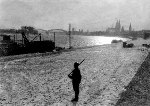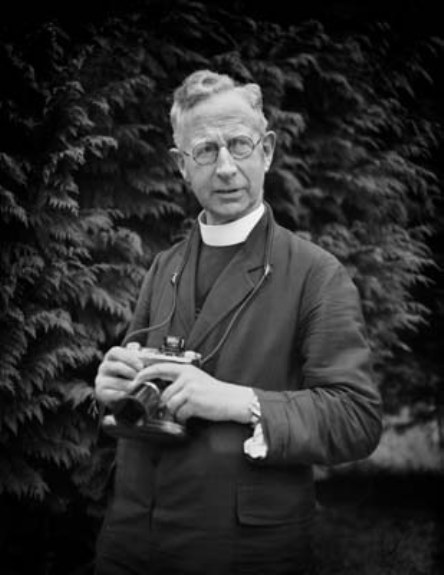Father Browne's Finest Pictures
In 1985 Father Edward O'Donnell SJ was
searching in the basement at the Irishjesuit Provincial's House when he
came across
 a large black metal trunk, in it he found a large colletion of negative
albums, photographs and most amazingly of all an album containing
photographs of Titanic's voyage.
a large black metal trunk, in it he found a large colletion of negative
albums, photographs and most amazingly of all an album containing
photographs of Titanic's voyage.
All these photographs were
the work of Father Francis Browne SJ who died in 1960 and was almost
forgotten by this time. Subsequent investigations revealed he had
enjoyed worldwide fame in 1912 when his photographs of the Titanic’s
journey to Cobh were published worldwide. He had travelled first class
to Cobh having been given a ticket by his uncle Robert Browne, Bishop of
Cloyne. His remarkable pictures proved to be unique.

His first introduction to
photography was in 1897. Just prior to joining the Jesuits he went on a
Grand Tour of Europe. For this trip Uncle Robert gave him his first
camera and the pictures made on that journey showed great promise.
For some years he had
little opportunity to photograph but somehow his enthusiasm and artistic
ability were still evident at the time of the Titanic’s journey. In 1915
he was ordained to join the Irish Guards as chaplain. He was the most
decorated chaplain of WW1. In following years up to the 1950’s he
created almost 42,000 negatives in which he documented the life of the
emerging Republic of Ireland and fascinating aspects of Australia,
England and elsewhere. In the words of one critic he was described as “a
master photographer with an unerring eye”. David Davison was invited to
assess the negatives from an artistic/photographic point of view and
make recommendations on their conservation. The news was bad, over half
the negatives were on a dangerous nitrate base and many had deteriorated
badly.
Sponsorship was obtained which enabled David and his son, Edwin, to make
a complete set
of duplicate
negatives and preserve the collection for
posterity.
For
over 20 years Father Browne’s photographs have been published and
exhibited around the world and he is now recognised not only as the
greatest photographer in Ireland of the first half of the 20th
century but an outstanding photographer of world stature.
